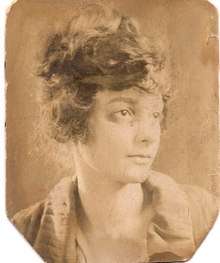Regina M. Anderson
| Regina Mathilde Andrews | |
|---|---|
 | |
| Born |
Regina M. Anderson May 21, 1901 Chicago, Illinois |
| Died |
February 5, 1993 (aged 91) Ossining, New York |
| Nationality | American |
| Other names | Regina M. Andrews (married name), Ursula Trelling (pen names) |
| Education | Wilberforce University, Columbia University library school |
| Occupation | Librarian |
| Employer | New York Public Library |
| Known for | Dedicated Librarianship, integral member of Harlem Renaissance, breaking the color barrier |
| Spouse(s) | William Trent Andrews, Jr. |
| Children | Regina Ann Andrews Baptiste |
| Parent(s) | William Grant "Habeas Corpus" Anderson, Margaret Simons Anderson Moore |
Regina M. Anderson (May 21, 1901 – February 5, 1993) was an African-American playwright and librarian. She was of Native American, Jewish, East Indian, Swedish, and other European ancestry (including one grandparent who was a Confederate general); one of her eight grandparents was of African descent, born in Madagascar. Despite her own identification of her race as "American",[1] she was perceived to be African-American by others, and became a key member of the Harlem Renaissance.
Biography
Born in Chicago, she studied at Wilberforce University, and Columbia University. She moved to New York and became a librarian at the 135th Street branch of the New York Public Library, working under the supervision of Ernestine Rose. She shared an apartment in the Sugar Hill district of Harlem with Ethel Ray and Louella Tucker. The women opened the space to the community, hosting salons, events, and gatherings for artists. Located at 580 Saint Nicholas Avenue, the apartment became known as the "580" and the "Harlem West Side Literary Salon".[2] Anderson helped to organize the Civic Club dinner of 1924 for black New York intellectuals and writers. Attended by 110 guests, including W. E. B. Du Bois, Jean Toomer, Countee Cullen, and Langston Hughes, the dinner was one of the coalescing events of the Harlem Renaissance.[2][3][4][5]
Andrews and Du Bois co-founded the Krigwa Players (later Negro Experimental Theatre), a black theater company. The Players produced her plays Climbing Jacob's Ladder (about a lynching) and Underground (about the Underground Railroad).
Regina Andrews was one of ten African-American women whose contributions were recognized at the 1939 World's Fair in New York.
She was the first minority to climb the ranks and become a supervising librarian at the New York Public Library and her struggle to break the color barrier has earned her numerous accolades.[1][4]
Andrews outlived virtually all of the other members of the Harlem Renaissance. She died in Ossining, a suburb of New York City.
Her husband was William T. Andrews, a lawyer and New York assemblyman.
Works
- Climbing Jacob's Ladder (1931, play)
- Underground (1932, play)
- A Public Library Assists in Improving Race Relations (1946, thesis)
- Intergroup Relations in the United States: A Compilation of Source Material and Service Organizations (1959, article)
- Chronology of African-Americans in New York, 1621–1966 (1971, co-editor)
- The Man Who Passed: A Play in One Act (published posthumously in 1996, play)
References
- 1 2 Whitmire, Ethelene (2007). "Breaking the Color Barrier: Regina Andrews and the New York Public Library". Libraries & the Cultural Record. 42 (4): 409–421. doi:10.1353/lac.2007.0068. Retrieved 9 September 2012.
- 1 2 Mirro, Julya (2004). "Anderson, Regina M.". Encyclopedia of the Harlem Renaissance. 2. New York: Psychology Press. pp. 25–26. ISBN 978-0-203-31930-7.
- ↑ Jefferson, Annetta (1994). "Andrews, Regina M. Anderson (c. 1900– )". Black Women in America: An Historical Encyclopedia. Bloomington: Indiana University Press. pp. 35–36. ISBN 0-253-32774-1.
- 1 2 Peterson, Bernard L. Early Black American Playwrights and Dramatic Writers. October 1990. 29-30.
- ↑ Lewis, Jone Johnson. "Regina Anderson". About.com: Women's History. March 30, 2010.
External links
- The African American Registry
- Whitmire, Ethelene. Regina Anderson Andrews, Harlem Renaissance Librarian. Chicago: University of Illinois Press, 2014.